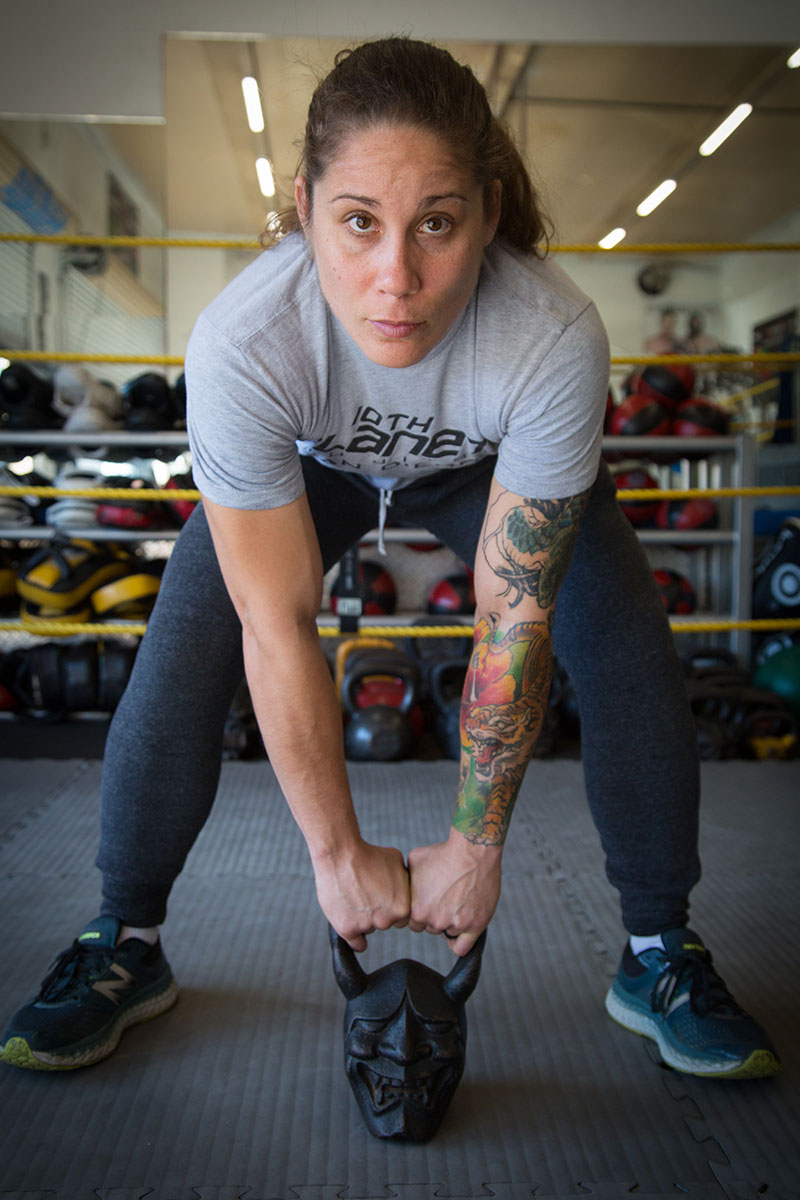Liz Carmouche is a pioneer for female athletes. She’s competed in Madison Square Garden and fought in the Ultimate Fighting Championship’s (UFC) first-ever women’s bout. Now, she’s ready to make her mark on another industry; cannabis. We sat down with Carmouche to learn more about the role cannabis is now playing in her fighting career.
Meet Liz Carmouche
Carmouche — aka the Girl-illa —was born in Louisiana, and grew up in Okinawa, Japan. She became one of the first females to introduce mixed martial arts (MMA) to the UFC when she competed against Ronda Rousey for the UFC’s inaugural women’s title fight in 2013. That night Carmouche also became “[…] the first openly gay fighter to compete inside the famous cage,” reported MMAMania.com.
The fight, Rousey explained to MMAJunkie reporters, was one of the toughest of her career; “That was the most vulnerable a position I’ve been in so far […],” she said of Carmouche’s neck crank. Though Rousey took the title, Carmouche went on to become one of the sport’s fastest rising stars.
She currently ranks sixth in the UFC’s female flyweight division where she holds a 12-6-0 record (wins-losses-draws). She holds a black belt in Brazilian jiu-jitsu.
Her first introduction to MMA came in 2010. By March 2011, Carmouche fought for Strikeforce’s Women’s Welterweight Championship title against Marloes Coenen. Coenen defeated Carmouche in the fourth round via submission (triangle choke).
“It was a loss, but I learned a lot from that experience,” she said. She’d only trained for a few months prior to the match against Marloes, who had a decade of experience over Carmouche. Still, she kept Marloes on her feet. “I held my own,” she continued, “It showed me that this is a sport I needed to pursue.”
Martial arts became a way for Carmouche to stay active after she left the military. Gym routines became monotonous, she explained, “I was bored of running and lifting weights.” She tired MMA and was immediately hooked.
Flying the Flag for the LGBT Community
Being an out, female fighter has positively impacted her — though she’s faced adversity along the way.
Carmouche served in the United States Marine Corps for more than five years. She worked as an aviation electrician and did three tours of duty in the Middle East. She served under the “Don’t Ask, Don’t Tell” era, which lasted from 1994-2011. The experience, she told GLAAD.org in 2013, was stressful; “I had to be very guarded all the times. […] I couldn’t even be open about myself even with my best friend in the Marines.”
She vowed never to hide who she was again. When she became a professional fighter she held to that promise. The UFC and her fans embraced it. The organization’s president, Dana White, publicly expressed his support and encouraged others to do the same.
“In the beginning,” Carmouche said, “I heard through the grapevine that I missed out on sponsorship opportunities [because some companies] didn’t want to sponsor an openly out athlete.” Ultimately, she added, “it didn’t play a role in my life. I am who I am; I’m not willing to compromise that […].”
Carmouche now serves as a representative for the UFC and LGBT community. She’s helped to establish the LGBT Center in Las Vegas, and joined forces with UFC hall of famer, Forrest Griffin, as a spokesperson for the “Protect Yourself at All Times” campaign.
CBD and the UFC

She’s also raising awareness about the benefits of cannabis as a representative for Hempmeds, a CBD hemp oil company. The company and its products play an important role in her journey as a fighter.
“I love [their] topical and salves and their active roll-ons are like Icy Hot — I live off of those,” Carmouche said. She automatically applies it when she gets out of training to relieve pain and inflammation.
Carmouche was hesitant when cannabis was first recommended to her. “I didn’t know what it was,” she explained, “I did my own research, and I found out just how beneficial it can be for athletes or for anyone with injuries they’re trying to combat.”
Joe Rogan — MMA commentator, and host of the podcasts, “The Joe Rogan Experience” — said that cannabis use is common in the UFC. Fighters, including Nick and Nate Diaz, Joe Jones, and Jake Shields (among others) openly advocate for its use.
The UFC recognizes the benefits of certain cannabinoids. In fact, the World Anti-Doping Agency (WADA) and the UFC officially removed CBD from their list of banned substances (THC and other cannabinoids remain prohibited).
Carmouche believes that combat athletes have much to gain from CBD.
As fighters, “we take so much impact and destruction to our bodies; we need to find something to take care,” Carmouche explained.
Research shows CBD is an effective neuroprotector; relieves pain; and has antispasmodic qualities. One study published in the “Journal of Bone and Mineral Research” suggests the cannabinoid helps heal bones, too.
Yet some athletes are too quick to take excessive amounts of ibuprofen or medications (like cortisone shots) to ease injuries, which have consequences. “They are bad for your liver and teeth,” she said, “CBD doesn’t have any side effects. Athletes realize that more and more.”
Carmouche also believes CBD hold benefits for veterans, too. “That’s who I learned [the value of cannabis] from,” she added, “CBD can absolutely help veterans because its helped me, and I’ve seen it help others.”